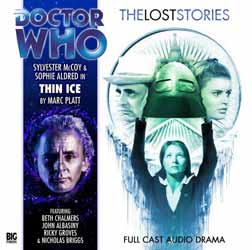|
Click here to return to the main site. Audio Drama Review
Moscow, 1967: the Doctor and Ace have arrived behind the Iron Curtain, where the Soviet Union is seeking a new weapon that will give it an advantage in the Cold War. What is the secret of the Martian relics? As the legendary War Lord Sezhyr returns to life, the Doctor is faced with some of his oldest and deadliest enemies: the Ice Warriors want one particularly important artefact back. However, this will not be a test for the Doctor, but for Ace. The Time Lord still has plans for her, and she’s not going to like them. He believes that she may be ready to graduate. The fate of Earth, and the future of Ace, are now intertwined... WARNING: CONTAINS SPOILERS! Like The Nightmare Fair and Mission to Magnus before them, the next few releases in this series are what I really think of as “lost stories”. These are adventures that never made it to the television screen, not because the production team had second thoughts about them (as happened with The Prison in Space), couldn’t get them to work to their satisfaction (as was the case with The Song of Megaptera) or because they were try-out pieces not intended for broadcast (such as The Fragile Yellow Arc of Fragrance), but because the plug was pulled for reasons beyond the production team’s control. Thin Ice (previously known within fan circles as Ice Time) would have seen the return of the Ice Warriors (those Martians really are cursed - they were previously due to make a comeback in the similarly ill-fated Mission to Magnus) and the departure of Ace, and would have sown the seeds for the introduction of her successor in the next story, Crime of the Century. It would have been screened as part of Season 27 in 1990... except that 1989’s Season 26 proved to be Doctor Who’s final series until the show’s revival in 2005. There are some familiar hallmarks of the era, when Andrew Cartmel was script editor: a setting in Earth’s recent history (because the BBC could realise this more effectively than alien or futuristic locations), a gang of peculiar bikers, and some Russians. Actually, Cartmel wanted the adventure to be set entirely in London, but, freed from the restraints of a TV budget, writer Marc Platt has moved some of the action to the USSR, as he reveals in his sleeve notes. Simon Robinson’s incidental music sometimes evokes the style of the late ’80s, but at other times sounds more like the earlier work of Dudley Simpson, perhaps in acknowledgement of the 1967 setting - which, incidentally, is when the Ice Warriors first appeared in Who. The writer takes other liberties with his story, perhaps because the original script was never finalised (I’m guessing) or simply because it is his own script and so he feels free to amend it (whereas several previous Lost Stories were adapted from the work of deceased or otherwise unavailable authors). Most controversially, he changes the ending so that, although she is tested by a Time Lord adjudicator (Nigel Lambert) as per the original story idea, Ace (Sophie Aldred) does not leave the Doctor to enrol at Gallifrey’s Academy. It could be argued that this avoids a continuity problem, in that this adventure appears to take place before any of Big Finish’s Seventh Doctor / Ace / Hex stories, and Ace’s departure has already been depicted variously in other media (such as her apparent death in the comic strip Ground Zero). However, Big Finish has shown little inclination of late to tie in with other spin-off ranges, and besides, Ace could always have dropped out of the Academy and resumed her travels in a later production. Maybe it has something to do with the fact that one of those previous departures was depicted in Platt’s own novel Lungbarrow! Unfortunately, the 15 minutes of interviews with the cast and crew shed no light on why the ending was changed. Due to time constraints, these interviews are at the end of Disc One and therefore remain spoiler-free. Perhaps we will learn more in the next release... I have rambled on for far too long about the alterations made to this story in order to present it on audio after more than 20 years. In fairness, the end result is one of the strongest entries in the Lost Stories series to date. The plot develops from intriguing to exciting to gripping; the guest cast, including Beth Chalmers, John Albasiny and John Banks, put on convincing Russian accents; and the regulars, Sylvester McCoy and Sophie Aldred, suddenly and miraculously sound younger, just like their 1989 selves. The Ice Warriors are given an interesting new angle - though the name Hhessh (played by Nicholas Briggs) does sometimes sound confusingly like Hex when Aldred says it. All in all, it’s a tragedy that the television production of this adventure was put on ice. 9 Richard McGinlay |
|---|

